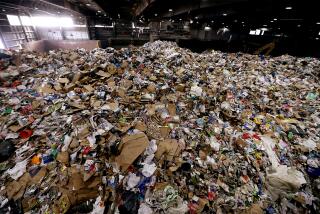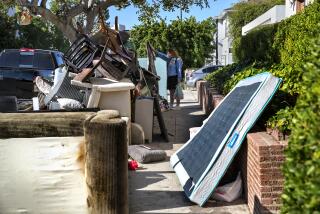OXNARD : Swedes Observe City’s Recycling, Trash Programs
- Share via
Henry Johansson had never seen anything like it.
The giant, mechanical arm reached out and snatched the green garbage can, easily lifting it in the air and shaking its contents into the rear of an Oxnard trash truck.
“We’ve heard of such a thing in my country,” said Johansson, a Swedish environmentalist watching the state-of-the-art trash trucks in action Wednesday. “It appears much more efficient than the way we do it.”
Swedish environmental officials were in Oxnard to learn about the city’s trash collection and recycling programs. The daylong tour was part of a weeklong review of environmental programs statewide by the nine-member delegation.
“Sweden is a small country,” said Pontus Gronvall, spokesman for the group of professors, environmental advocates and government officials. “That’s why it was important for us to come to a smaller city to see what you do and see what we can relate to.”
They saw worms feeding on rotting trash and turning it into compost. They inspected Oxnard’s automated garbage trucks, which allow one trash collector to do the work of two.
And they learned about the city’s plan to build a waste transfer station, a giant warehouse where recyclables will be sorted and trash will be shipped to dumps outside Ventura County.
“Our landfill is about to close, so the city is preparing for the long run,” Oxnard City Planner Cynthia Daniels told the Swedes as they munched on pastry adorned with American flags.
Gronvall said Sweden has made many trash collection advancements. Recycling and composting are popular in his country. And, in a limited pilot project, government officials have inserted computer chips into garbage cans to weigh trash so that customers only have to pay for what they throw away.
“In Sweden, we have a philosophy that if you use something, instead of throwing it away, you should put it right back into the system,” Gronvall said. “Hopefully in the future, we won’t need any more landfills.”
More to Read
Sign up for Essential California
The most important California stories and recommendations in your inbox every morning.
You may occasionally receive promotional content from the Los Angeles Times.













